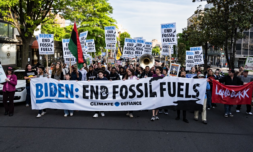Some $14 trillion of assets have up and left Climate Action 100+. Key corporate members JP Morgan and State Street have announced their resignation from the global investment group while BlackRock has significantly limited its involvement. Sigh.
Climate adaptation costs could reportedly climb to $340 billion by 2030. Yet, a duo of financial behemoths worth a combined $14 trillion deem this a great time to jump ship from coordinated international efforts to thwart climate change.
JP Morgan and State Street recently confirmed that they would be quitting the Climate Action 100+, a bloc of over 700 investment outfits which aims to drive carbon emissions out of the corporate world and achieve net zero transitions by 2050.
Despite an uptick in 60 on-boarded companies this past quarter, the exit of these two major players is cause for concern given the suspicious timing of their decision. The cynic in me also believes there could be more blows to come.
Last June, the CA100+ detailed its plans for ‘phase two’, which involved demanding that signatory laggards engage with policymakers and accelerate their plans to achieve net zero businesses before the deadline of the Paris Agreement.
Since this announcement, US-based asset managers have been under increasing pressure from Republican Politicians who continue to pull funds from pro-ESG (Environmental, Social, and Governance) initiatives.
JP Morgan was one of 53 US financial firms to be warned that its participation in ESG groups is a significant conflict of interest with some of its investors and their goals. If proven in court, this could be deemed illegal under anti-trust law.




















